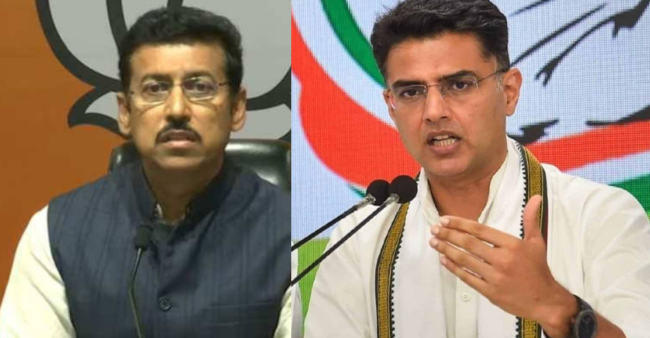The BJP has now given the task of winning back the Jhotwara Assembly seat to Rajyavardhan Singh Rathore.
Rajasthan’s Jhotwara Assembly constituency falls under the Jaipur Rural Lok Sabha constituency which is currently represented by BJP’s Rajyavardhan Singh Rathore, nicknamed “Chilly”. Rathore had won the parliamentary election with a margin of 2,93,171 votes by trouncing Congress candidate Krishna Poonia. The BJP has now given the task of winning back the Jhotwara Assembly seat to its sitting MP from the area.
The desert state’s Opposition party is hoping that Rathore’s presence in the campaign would energise the party workers in all the seven Assembly constituencies under his parliamentary seat.
Rathore, an Olympian and former serviceman, is vocal about the sufferings of the people of the state due to poor governance. He has alleged that governance, especially the law and order situation, has been a casualty in the power struggle between
In the last Assembly election in 2018, the Congress prevented the BJP from recording a hat-trick on the Jhotwara seat and wrested the constituency from the saffron party after 10 years.
Voters in Jhotwara have always been vocal about water shortage and poor health facilities. The demanding electors of the constituency, usually, vote on the basis of the promises or development work done by the candidate rather than blindly following their family’s political affiliation.
Electors from communities like Yadav, Brahmin and SC/ST play a key role in the outcome of elections in the constituency. Rajput and Jat voters traditionally back the BJP.
In the past five years, the number of electors in the constituency has gone up by over 10% – an indication of enrolment of a high number of young and first-time voters. In the election on November 25, there are 4,02,381 eligible electors in the constituency. Out of these, 2,10,018 are men and 1,92,363 are women.
The 2018 battle between Congress and the BJP made headlines as the winner and the losers both logged the highest number of votes in their respective category in the state. Lal Chand Kataria bagged 1,27,185 votes, the highest among all winners. The BJP candidate, Rajpal Singh Shekhavat, lost by a margin of 10,747 but he got the highest number of 1,16,438 votes among all losing contestants.
Tonk
Sachin Pilot, Rajasthan’s chief minister-in-waiting, appears to have struck a chord with electors of his Tonk Assembly Constituency in his very first term from the seat. This is the reason that he has been renominated from the seat by his party for the 25 November election.
One of the rare politicians who began their legislative career with Lok Sabha election, Pilot became the youngest-ever Lok Sabha MP at 26 in 2004 when he won from Dausa seat. Tonk assembly election in 2018 was the first state election of his two-time MP.
Tonk Assembly constituency falls under the Tonk-sawai Madhopur Lok Sabha constituency. Pilot’s victory margin in the 2018 election was almost as much as the number of votes garnered by his BJP rival. Pilot got 1,09,040 votes and his BJP challenger Younus Khan got 54,861. The victory margin was 54,179.
The constituency with 2,24,106 electors is dominated by voters from Muslim, Meena and Gujjar communities. This is one of the reasons why BJP’s prominent Gujjar leader, Ramesh Bhiduri, MP from South Delhi, has been made poll incharge of the Tonk district.
Like many other constituencies, water shortage is a huge problem faced by voters. They also demand more jobs and development–especially a rail link and better roads.
In 2018, it was for the first time in 40-years that the Congress had fielded a non-Muslim candidate. The BJP had also broken its tradition and fielded its first Muslim candidate from the seat in decades.

